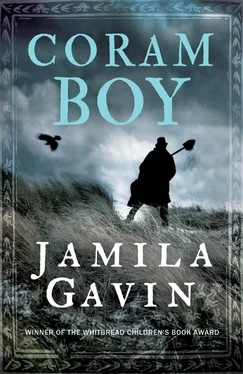Today, as he looked at his angel, he didn’t lie dead. The choir was rehearsing and he always loved hearing the singing. He edged further down the nave, wanting to be closer. Beyond the wooden carved Kent screen, in the chancel, men and boys stood in their stalls. He peered round, catching glimpses of their faces in the flickering candlelight as they concentrated on bits of paper held in their hands, with wriggly symbols which they translated into music. Tears welled in his great sloppy eyes. Music always affected him. He wished he could sing as they did. He opened his mouth. A frightful squawk came out. Some boys looked up and giggled.
‘Hey, you! Go on, get out of here and take that hound with you!’ A cleric came flapping down the aisle like some clumsy bird, waving his hands at them. He was always on the lookout for vagrants, who would endeavour to sneak into the church out of the cold rain for the night. Meshak and Jester ran out, little as ants beneath the huge flying buttresses and stone walls rising high as the walls of a canyon. They scuttled away across the great paved entrance and out into the mud and mire and filth of the city streets.
Chapter Four  Thomas and Alexander
Thomas and Alexander
The cathedral bells chimed. ‘Home, home, tomorrow we go home,’ the boy choristers murmured excitedly.
Thomas and Alexander shuffled in their stalls in line with the other boy trebles. They nudged and pushed and exchanged boyish insults, while the lay clerks, older men – the tenors and basses – cuffed their ears and told them to mind themselves.
‘Ummum, now boysum . . . we’llum sing through psalmum 48 . . . Sssh . . . ’ Dr Smith, the choirmaster, rapped the lectern fiercely with his baton. The great organ boomed out the opening chords of an anthem by their old organist, William Hines. The boys, with eyes fixed on the choirmaster, opened wide their mouths and sang with piercing sweetness.
Treble voices rang round the great cavernous cathedral. The candles flickered softly in the evening light, which barely penetrated the cathedral. They had been up since five, working to earn their keep by scrubbing floors, digging vegetables, feeding the livestock and cleaning out the sheds and stables in the cathedral close. Now they were yawning but excited, wanting to sleep so that the next day came quicker.
Alexander’s voice soared above the others as he took the solo – always causing a shiver of wonder at its purity. When he hit the very highest note, it cracked slightly. Thomas felt his friend shudder beside him, though Alexander didn’t falter and continued strongly to the end. Everyone knew that, no matter how glorious the treble voice, the time would come when it would break. And no one – but no one – could prophesy which boy could make the transition and become an equally good tenor or bass.
Alexander’s face was pale as he concentrated on producing a clear sound.
He had already begun to confide his fears to Thomas. ‘Once my voice has broken, that will be the end of my musical life,’ he had said with anguish.
‘But that’s not possible,’ Thomas had exclaimed. ‘Surely, you will play and compose. You’re not just a singer, you are a musician!’ Thomas glanced up at Alexander who, at fourteen, was tall now – almost manly. He wasn’t handsome in the normal way; he had thick, dark-brown, curly hair which fell round a broad-boned face, heavy lips, a protruding brow and eyes which, though blue, could look almost black and gave him a dazed, inverted look, as if he lived more inside himself than outside. Thomas noted the faintest shadow round his jaw and above his lip, and knew that his friend would not sing as a treble much beyond Christmas. But Thomas couldn’t understand how that would be the end of his life in the cathedral. Surely the cathedral wouldn’t want to lose him, and Alexander would teach, conduct and continue to compose as other gifted pupils had done when their voices broke?
But Alexander was gloomy and just said, ‘My father forbids it.’
‘Home, home, home.’ It sounded like the low buzz of honey bees. It was August and for a whole month there would only be ‘said’ service instead of ‘sung’ so that the boys could go back to their farms and help with the reaping and hay-making. Not since they became choristers had the boys been at home for Easter or Christmas Day, because that was when their music was most needed.
Alexander nudged Thomas in the ribs. ‘At last you’re coming to Ashbrook. At last you’ll see my dog Bessie and my new wolfhound pup Zanzibar – well not a pup any more. Isobel writes to say he’s nearly full size and very naughty. I hope he’ll know me and react to my commands . . . We’ll go shooting with him – yes?’
‘Ummum now, boysum . . . we’llum sing through psalmum 48 again.’
Thomas was saved from having to try to look enthusiastic when inside he was uneasy about his forthcoming visit to Alexander’s house. It would be the first time that he had ever left the city of Gloucester. Most of the other boys came from all corners of the county, one as far away as Dursley and others from Wotton-under-Edge, Bibury, Minchinhampton or Cirencester. Thomas had been born near Gloucester docks, and the first time he had ever been away from home was when he became a chorister and came to live in the cathedral. With the cathedral being barely a stone’s throw away from the docks, it hardly felt like leaving home, for Thomas was often able to escape to see his mother and father and all his brothers and sisters. So he was full of apprehension at the prospect of leaving the city for the very first time. But more than that, he was nervous about going to the home of a boy the others called a ‘gentleman’. He wasn’t sure that he had ever met a gentleman, although he could recognise a gentleman if he saw him on the street by the cut of his clothes and the deference with which he was treated. They were people far removed from him, who rode round in carriages and lived in remote big houses which he had only heard about, but never seen. He knew that the clergy at the cathedral were gentlemen but, somehow, enveloped in their clerical robes that was different. What would it be like to go to the home of a gentleman, be under the same roof as a gentleman – especially someone like Alexander?
It was five years now since he joined as a new chorister aged eight. Alexander had already been a scholar for a year. Only slightly older, it was Alexander who had been put in charge of him and ordered to show him the ropes. A dour and unsmiling boy, he had dutifully led Thomas round the cathedral precincts, showing him the schoolroom and the song room where they learnt their music, and Miller’s Green, the schoolmaster’s house. He told him where he could and could not go, where they practised, where they worked, ate, slept and studied, the times of the services and practices. But once the tour was over and they were back in the schoolroom with the other boys, Alexander seemed to relinquish his responsibility for him.
It was in the schoolroom that they slept, on thin mattresses on the floor and lining the walls, and Thomas would never forget that first night. The boys had jumped on him. Not Alexander – he had disappeared – but the others. Then had followed a few hours when he was sure he was going to die. They had held his legs and tipped him head first out of the window; they had dunked his head in the piss pot; they bundled him out of the room and into areas of the cathedral he had never been; they had pushed him up steep spiral steps till they reached the tower, and there they made him stand, blindfolded on the parapet, knowing that one false step could cause him to plunge to his death. The next night and the next, there were more trials and tribulations. Where was Alexander, his supposed protector? he wondered bitterly. He was never around during this torture, either to take part or intercede for him.
Читать дальше

 Thomas and Alexander
Thomas and Alexander










